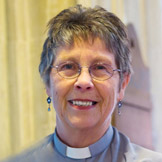People who are exploring this kind of spirituality are usually very open to God, who often works quickly within them. Apparently 76% of people claim to have had some sort of spiritual experience, varying from a smell, to a vision, to a feeling, to a ghost.
Some of those people are actually called by God to a different way of life. And some may be called by God without being aware that God has called them. Many people move into a career or a choice of partner because it feels right to them, but perhaps this feeling of rightness is how God calls them.
About six hundred years before Jesus was born, the poet we have come to know as Second Isaiah or Deutero-Isaiah was called by God and our Old Testament reading today is an account of his calling, written in his own poetry.
The complete book of Isaiah had several authors. The first writer - Isaiah himself - was born about eight hundred years before Jesus and a very clear account of his call is given in chapter 6. The second writer, Deutero-Isaiah, was a couple of centuries later and his call came just before the end of the Jewish exile in Babylon. This second writer had seen plenty of suffering in Babylon and struggles to understand the problem of suffering, in relation to God. Why does God allow suffering? What does it all mean? Second Isaiah gives his own observations and theology in his wonderful "Suffering Servant" poems in chapters 42-53, which have since become seen as an amazingly accurate description of Jesus.
When Deutero-Isaiah was called by God, the people had been suffering in exile for years under a foreign power, so Deutero-Isaiah's call is full not of God's warnings and threats, but of comfort and hope. In a hopeless situation, God offers his people hope through their new prophet:
Comfort, O comfort my people, says your God. Speak tenderly to Jerusalem, and cry to her that she has served her term, that her penalty is paid, that she has received from the Lord's hand double for all her sins.
The punishment is over, the price has been paid and it is time now to prepare for the way to recovery. So the call continues:
"In the wilderness prepare the way of the Lord, make straight in the desert a highway for our God. Every valley shall be lifted up, and every mountain and hill be made low; the uneven ground shall become level, and the rough places a plain. Then the glory of the Lord shall be revealed, and all people shall see it together, for the mouth of the Lord has spoken."
Like the Suffering Servant songs, these are well-known words because they have been picked up by the gospel writers and used to refer to John the Baptist. But in the gospels the meaning has been slightly altered to read, "A voice of one crying in the wilderness", since John the Baptist came from the wilderness. In the Isaiah version it's the people who are in the wilderness, so the passage reads, "A voice of one crying, "In the wilderness.."
The Isaiah passage continues, because Isaiah wants God to tell him what he should say to the people:
A voice says, "Cry out!" And I said, "What shall I cry?"
The answer is that he's to tell the people that even though everything on earth eventually fades and dies, including human beings, God always remains steadfast and strong. God will never fade and will never fail. And the final verse is a wonderful description of how God views his people and how he will deal with his people:
He will feed his flock like a shepherd; he will gather the lambs in his arms, and carry them in his bosom, and gently lead the mother sheep.
Perhaps if we look at our own lives we can see a similar pattern to the pattern of Israelite society. Like the Israelites of old, we too have bad times, but during those bad times God tenderly carries us and cares for us. And these bad times are invariably followed by good times. The danger is that like the Ancient Israelites, we tend to forget God during the good times and look for him only when we desperately need him because there is nowhere else to turn.
Our non-churchgoing society has a noticeable spiritual hunger, a hunger which it tries to satisfy through all kinds of pick-and-mix alternatives to organised religion. Just as God called Deutero-Isaiah, perhaps God is calling people now to go out from the Church into society, to tell people about our Suffering Servant Jesus, about how Jesus can still impact on our lives today and to tell people about God's steadfastness and deep love for them.
Are you one of those people? Is God calling you? Have you asked him what you should say?


